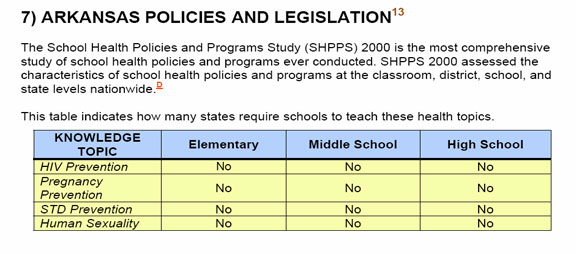Why is Comprehensive Sexuality Education Needed?
Just like every young child must be taught self-care (brusing his teeth, how to clean and to care for his/her body, how to dress himself), the pre-adolescent, in order to understand the metamorphosis from child to adult, needs to be "filled in" on the details of body, hormone, and emotional changes associated with puberty and educated about self-care required for the maturing body. Going through puberty is, for many youth, a rocky transition for which they are ill-prepared.
Some parents assume that their child will learn these things in school as part of science and/or health classes. In most schools in our state, this simply is not so.

source: www.ccsso.org/content/pdfs/SPARKANSAS.pdf
While most parents educate their own children about the changes the human body undergoes through puberty and fill their children in on basic details in advance so that the child knows "what to expect," many stop short of teaching their children about self-care in the realm of sexuality. These parents have no problem explaining use of deodorant, the need for more frequent showers, and how to use feminine hygiene products and where to purchase them, but they balk at the idea of explaining birth control options and the importance of latex condoms in offering protection from most STD's. Some parents fear that talking about sexuality issues like methods of protection will "give them ideas" or cause an adolescent to experiment sexually -- or, Heaven forbid, think that because a parent is informing them of these things, he/she is saying it's OK or giving the "green light." Human sexuality instruction that begins at home and incorporates the family's values is definitely the ideal, but even the most communicative and well-informed parents may not know the latest medically-accurate information about a host of sexually transmitted infections, how they are transmitted, and what the symptoms are.
Many parents explain too little and/or wait too late. When we tell our children to "just say no," we KNOW that this course would be the best for them, but we have most likely learned from past experience that the child lacks. As a parent, we may be forgetting how many youth, in their desire to become independent adults, reject parental advice . . . or how, desperately wanting to "fit in" and lacking effective refusal communication skills, they cave in to peer pressure.
Telling an adolescent to "just say no" without teaching them HOW to say "no" and how to protect themselves by looking out (in advance) for situations that could lead to trouble, is another reason why comprehensive human sexuality courses that stress abstinence and offer opportunities to practice refusal teachniques and communication skills are crucial. To withold critical information in the hopes that our children will make the right choices puts youth at risk.
A current example in the news is the scare at a St. Louis, Missouri high school. One anonymous person somehow connected with the school discovered he or she was infected with HIV, and in an attempt to be responsible, informed members of the Health Dept that possibly as many as 50 students at the school could have been exposed to the virus. Because the people of the community and the students themselves had not been informed of the facts about HIV and how it is transmitted a "scare" evolved. Youth as young as 14 report fearing that they may have been infected and that they fear not finishing school or even getting to their sophomore year when, had these youth been given the proper facts, they'd know that they are safe from contracting HIV if they are not sharing needles (drugs or body piercings/tattooing), not having sex (or not having unprotected sex), and/or have not been in contact with the blood, semen, vaginal fluid, or breastmilk of an infected person.
Talking to adolescents about sexually transmitted infections and how they are spread by providing current and accurate medical facts is one important component of comprehensive human sexuality courses. Having this knowledge might even help an undecided youth decide to abstain or to wait, or at least, to decide to engage in less risky behavior by limiting the number of partners and by deciding to always use protection when sexually active.
Results of a new study recently released indicate that when youth promise to abstain and take a "virginity pledge," though they may be well-intentioned, their sexual behavior doesn't differ from youth who do not take a pledge -- the same percentage still engage in premarital sex. . . but the consequences of withholding information about protective measures varies between these two groups. The virginity pledgers were much less likely to use birth control and protection than the non-pledgers. (link to full article -- Washington Post / MSNBC)
|